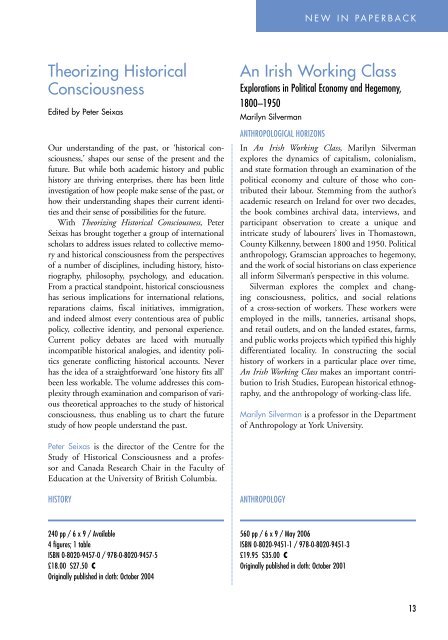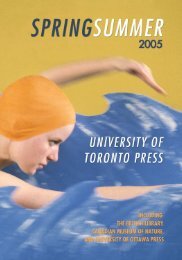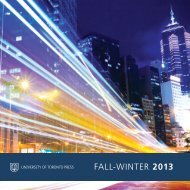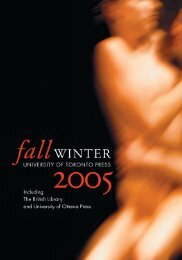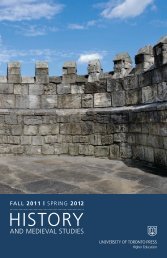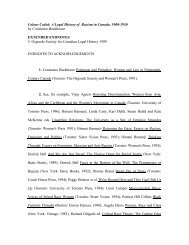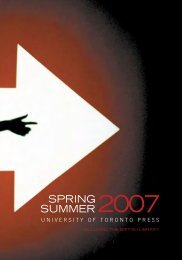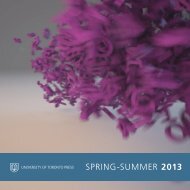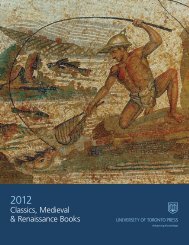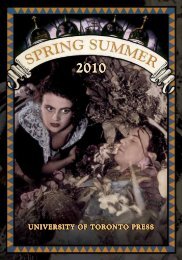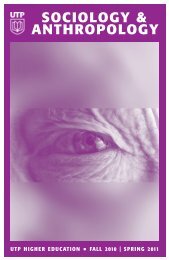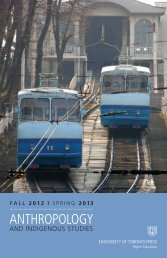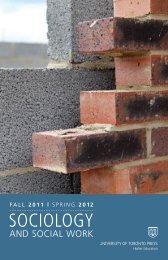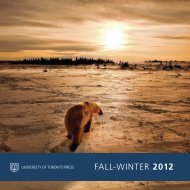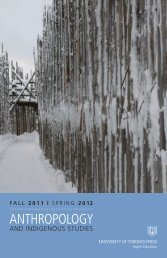Fall/Winter 2006 - University of Toronto Press Publishing
Fall/Winter 2006 - University of Toronto Press Publishing
Fall/Winter 2006 - University of Toronto Press Publishing
Create successful ePaper yourself
Turn your PDF publications into a flip-book with our unique Google optimized e-Paper software.
N E W I N PA P E R B A C K<br />
Theorizing Historical<br />
Consciousness<br />
Edited by Peter Seixas<br />
Our understanding <strong>of</strong> the past, or ‘historical consciousness,’<br />
shapes our sense <strong>of</strong> the present and the<br />
future. But while both academic history and public<br />
history are thriving enterprises, there has been little<br />
investigation <strong>of</strong> how people make sense <strong>of</strong> the past, or<br />
how their understanding shapes their current identities<br />
and their sense <strong>of</strong> possibilities for the future.<br />
With Theorizing Historical Consciousness, Peter<br />
Seixas has brought together a group <strong>of</strong> international<br />
scholars to address issues related to collective memory<br />
and historical consciousness from the perspectives<br />
<strong>of</strong> a number <strong>of</strong> disciplines, including history, historiography,<br />
philosophy, psychology, and education.<br />
From a practical standpoint, historical consciousness<br />
has serious implications for international relations,<br />
reparations claims, fiscal initiatives, immigration,<br />
and indeed almost every contentious area <strong>of</strong> public<br />
policy, collective identity, and personal experience.<br />
Current policy debates are laced with mutually<br />
incompatible historical analogies, and identity politics<br />
generate conflicting historical accounts. Never<br />
has the idea <strong>of</strong> a straightforward ‘one history fits all’<br />
been less workable. The volume addresses this complexity<br />
through examination and comparison <strong>of</strong> various<br />
theoretical approaches to the study <strong>of</strong> historical<br />
consciousness, thus enabling us to chart the future<br />
study <strong>of</strong> how people understand the past.<br />
An Irish Working Class<br />
Explorations in Political Economy and Hegemony,<br />
1800–1950<br />
Marilyn Silverman<br />
ANTHROPOLOGICAL HORIZONS<br />
In An Irish Working Class, Marilyn Silverman<br />
explores the dynamics <strong>of</strong> capitalism, colonialism,<br />
and state formation through an examination <strong>of</strong> the<br />
political economy and culture <strong>of</strong> those who contributed<br />
their labour. Stemming from the author’s<br />
academic research on Ireland for over two decades,<br />
the book combines archival data, interviews, and<br />
participant observation to create a unique and<br />
intricate study <strong>of</strong> labourers’ lives in Thomastown,<br />
County Kilkenny, between 1800 and 1950. Political<br />
anthropology, Gramscian approaches to hegemony,<br />
and the work <strong>of</strong> social historians on class experience<br />
all inform Silverman’s perspective in this volume.<br />
Silverman explores the complex and changing<br />
consciousness, politics, and social relations<br />
<strong>of</strong> a cross-section <strong>of</strong> workers. These workers were<br />
employed in the mills, tanneries, artisanal shops,<br />
and retail outlets, and on the landed estates, farms,<br />
and public works projects which typified this highly<br />
differentiated locality. In constructing the social<br />
history <strong>of</strong> workers in a particular place over time,<br />
An Irish Working Class makes an important contribution<br />
to Irish Studies, European historical ethnography,<br />
and the anthropology <strong>of</strong> working-class life.<br />
Marilyn Silverman is a pr<strong>of</strong>essor in the Department<br />
<strong>of</strong> Anthropology at York <strong>University</strong>.<br />
Peter Seixas is the director <strong>of</strong> the Centre for the<br />
Study <strong>of</strong> Historical Consciousness and a pr<strong>of</strong>essor<br />
and Canada Research Chair in the Faculty <strong>of</strong><br />
Education at the <strong>University</strong> <strong>of</strong> British Columbia.<br />
HISTORY<br />
ANTHROPOLOGY<br />
240 pp / 6 x 9 / Available<br />
4 figures; 1 table<br />
ISBN 0-8020-9457-0 / 978-0-8020-9457-5<br />
£18.00 $27.50 C<br />
Originally published in cloth: October 2004<br />
560 pp / 6 x 9 / May <strong>2006</strong><br />
ISBN 0-8020-9451-1 / 978-0-8020-9451-3<br />
£19.95 $35.00 C<br />
Originally published in cloth: October 2001<br />
13


